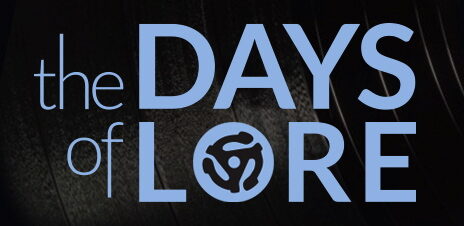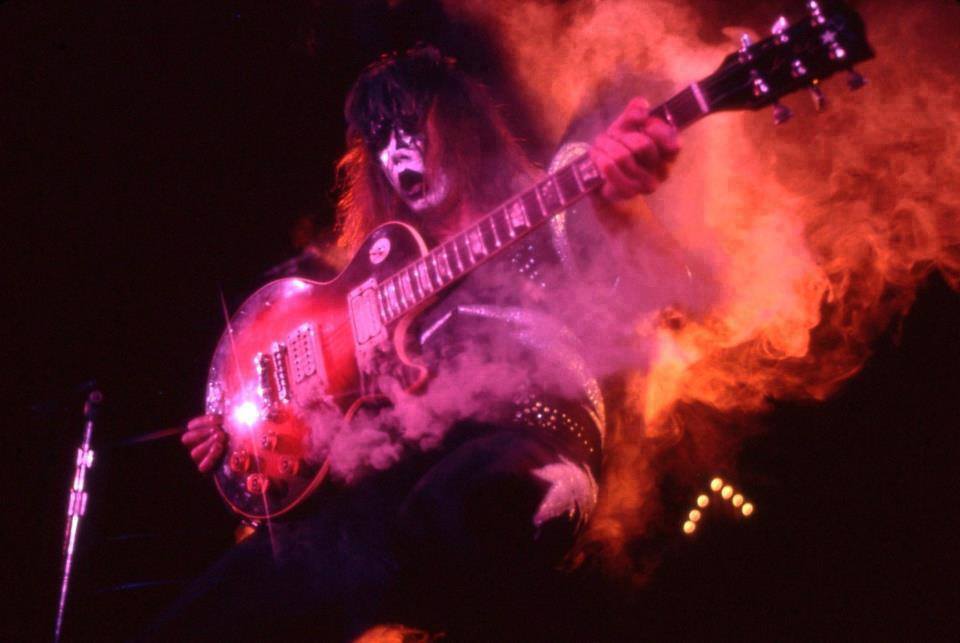
Traveling back in time to look at a my own KISStory, as well as that memorable afternoon in New York City with Ace Frehley, lead guitar
Editor’s Note: I was reminded this week that it was four years ago when a misunderstood email led to crowdfunding campaign that would help send me to New York City to interview original KISS guitarist Ace Frehley in person. It was documented in this piece, which originally published on May 4, 2016 in Paste Magazine as part of a metal column I wrote called HEAVIÖSITY. I had the idea to post some of it here and link to the original story, but it turns out the article doesn’t exist on the website anymore. I imagine something happened during a server switchover, as some of the work I contributed to Paste still appears on the site. So I’ve dug it up and I’m preserving what I wrote here in a safe place. I’m also presenting it the way I want. It’s one of the pieces I’m most proud of. It’s also one of the last big features I wrote before scaling back my freelance work to accommodate the growing responsibilities of being a stay-at-home dad. I hope you enjoy it.
Ace Frehley forgot his guitars.
We’re in the backseat of a black Suburban across the street from his hotel near Times Square. Ace and I are supposed to be heading to Electric Lady Studios, where he’s scheduled to film an episode of the popular web series Guitar Moves. Frehley—who still looks every inch a rock star with his tinted Ray-Bans, a red buttoned-down Western shirt exposing a black Electric Lady T-shirt, and tight black, slightly flared pants—is already running late. He fumbles through his bag and his pockets in search of his hotel key so he can retrieve his intruments—Ace forgot that, too. He chuckles.
Frehley’s publicist tells us to go ahead, and that he’ll go back up to the room, grab the guitars and take a cab to the studio. It’s a classic Ace moment, one that I’m sure endlessly infuriated his former KISS bandmates Gene Simmons and Paul Stanley. But in this case it’s endearing and mildly amusing.
Despite still being a little spacey, Ace is doing well these days. He’s living in San Diego with his fiancé Rachael Gordon [Frehley split with Gordon in 2019—Ed.]. He’ll celebrate 10 years of sobriety in September. He also has a killer band, and just finished a new album of covers called Origins Vol. 1—his third record in seven years—that nods back to the bands and guitarists that moved a young Paul Daniel Frehley to rock ’n’ roll all nite.
“My late-teens…it was just amazing the amount of music I was exposed to,” says Frehley, recalling the first time he saw Cream and The Who at the RKO Proctor’s 58th Street Theatre in March of 1967 (the show was part of a series produced by eccentric disc jockey and promoter Murray the K that also featured Smokey Robinson and the Miracles). “Then Led Zeppelin and The Jimi Hendrix Experience came out. I mean, I roadied for Jimi Hendrix in 1970. God, it was a crazy couple of years.”
It’s around 5 p.m., and the Midtown traffic is in full snarl. Frehley, who’s known to be moody, is in good spirits, occasionally distracted by what’s happening outside the rear passenger-side window. Me? I’m rolling through New York City in the back of a Suburban with Ace Frehley talking about KISS—I’m fucking fantastic. My fandom goes back to age 5, confirmed by the KISS pajamas tucked in my bag that I’d have him autograph later that night.
Ace isn’t the slightest bit phased by the fact that our driver has come close to kissing a few bumpers (of course, he’s wrecked more than his fair share of cars back in the day). Horns blast in frustration. The scene is quintessentially New York—the city that made Ace, and the city that created KISS. We’re only 10 minutes away from the famous loft on 10 East 23rd Street where in 1972 the four original members dared to conquer the world. Further up north in the Bronx Ace and his older brother Charley learned to play guitar as kids, and formed a band called The Micro Organism. I ask Ace if he visits his brother (who plays in a folk duo called The Bridge Band) or his old neighborhood whenever he’s back in the New York groove.
“I don’t have the time,” Frehley says in a sturdy Bronx accent. He sounds exhausted thinking about it. “I saw Charley when I was inducted into the Rock & Roll Hall of Fame, but we’re not really that close to be honest. Me and Charley were in our very first band together, but once I hit 14-15 I started playing in other bands and we sort of separated. He was more into folk music. He went to college and became a classical guitar player.”
Ace, on the other hand, cut school, ran with the Ducky Gang, boozed and chased girls. He also played in rock bands like King Kong, The Exterminators and Molimo. By the time Frehley joined KISS in early-1973, the trio of Simmons, Stanley and drummer Peter Criss had already been working on songs and scheming up some of the band’s visual concepts. As KISStory tells us, Frehley showed up wearing one orange sneaker and one red sneaker and jammed with the band on “Deuce”—still Ace’s favorite KISS song—as he fired off a greasy, melodic lead and easily landed the job.
“Deuce” wasn’t the first KISS song I heard as a kid, but it’s definitely the one that left the most lasting impression. It’s still my favorite, too—the Alive! version, of course. I remember listening to that cassette at night on some $10 Walkman knockoff I had, my 12-year-old brain putting in the extra work to create the visuals of the stage, the bombs, the blood and Ace’s smoking guitar. The walls of my room were, of course, plastered with posters and cutouts from Circus and Hit Parader.
Thirty years later my office is essentially a slightly cleaner version (but not much) of my old room at my parents’ house out in the sticks in Northern California. And I’ll still stick up for KISS, but I’m less likely to get pissed off and call you a fuckin’ dickweed over it (although I still think those who still view the band as a bunch of hacks probably lead joyless lives). It’s difficult for some to look past the makeup and the bombs and the adolescent lyrics (ya know, rock ’n’ roll incarnate), but there’s more to KISS.
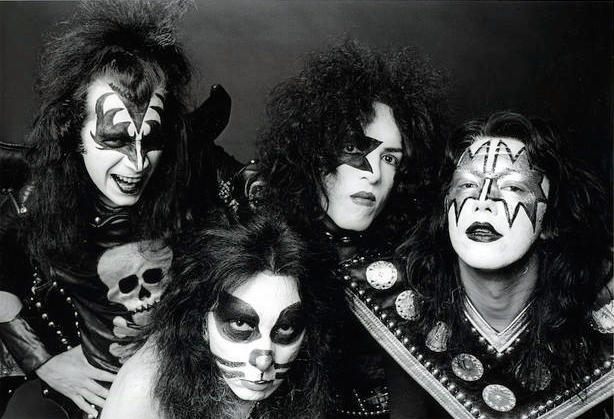
“I learned a lot working with those guys,” says Frehley. It’s obvious he really loves and admires his former bandmates, despite whatever barbs they’ve tossed at each other in interviews. “The way they would blend harmonies…I mean, think about all those early KISS songs with three-part harmonies. That’s what made the group so strong—we had four lead singers. If we had to, we could do four-part harmonies. That was one of KISS’s strong points besides all the theatrics. Plus, we wrote good songs. Catchy songs. It wasn’t just all show.”
And then there were Frehley’s guitar solos, most of them as hummable as the choruses. I’ll go on the record right here: The lead on “Shock Me” is one of the greatest rock guitar solos ever. Yet, outside of The KISS Army, Ace never really gets his due. Dark Lord knows I’ve spent my most of my life trying to make people see the error of their ways.
I guess my KISS geekdom is the reason I’m sitting across from Frehley in the first place…that and a small misunderstanding by email (when I contacted his publicist, he assumed I lived in New York and invited me to interview Frehley in person). My friends made sure I got on a plane to New York to interview the member of KISS I was nicknamed after (a friend started calling me “Ace” at a debauched New Year’s party in high school), going as far as setting up a GoFundMe to help cover the airfare. Getting there didn’t go quite as planned. A blizzard in Denver, Colorado, caused delays, cancellations and more cancellations, and I spent what amounted to 24 straight hours either in the air drinking whiskey or in a dirty airport praying for the goddamn Chick-fil-A to open. Touching down in New York felt like a miracle.
By the time I arrive at Ace’s hotel on a temperate New York afternoon, I’m running on four cobbled-together hours of sleep, two beers and one cup of coffee. I enter the room as the journalist before me is snapping a few photos with him. I spot Ace’s lightning-bolt guitar strap coiled up on a table, and I get a little tingle in my belly. It’s a little after 4 p.m. and Frehley has been doing interviews since 9 in the morning. Despite that, he’s friendly and lucid. He takes his shades off when we talk. He’s tanned, and his fingers are thick and knotty, adorned with a few rings, including a shiny silver skull that a fan gave him years ago at a show.
Frehley is excited about his new record, Origins Vol. 1. And he’s eager to talk about his influences, too—especially The Who. Seeing the band in 1967 probably had the biggest impact on him.
“You know, Daltrey’s slinging the mic around. Townshend’s throwing his guitar up in the air and catching it on the beat, smashing it into the amps. Keith Moon’s wrecking his drum kit at the end of the show. It just grabbed me. That day I said, ‘I gotta be in a theatrical rock group.’”
KISS ruled arenas throughout the 1970s. The crude and campy early stage shows included candelabras, a levitating drum riser operated by a chain pulley, and Ace’s signature smoking guitar, in which he placed actual smoke bombs inside the pickups (it looked cool, but wasn’t very good for the guitar). The more money that poured in, the bigger and sleeker the shows became—and along with that more drugs, more groupies and more strife within the band. While Simmons and Stanley kept their business eyes focused on maximum profit, Frehley and Criss were getting eaten alive by cocaine, booze and pills.
“I knew it right from the beginning,” Frehley says of the members’ antithetical personalities. “I could identify with Peter, and we became closer as the years progressed. Paul and Gene are from different backgrounds. We’re four very different people, you know, but opposites attract. For some reason with the four of us there was a chemistry and an energy that hasn’t been duplicated.”
This is 100 percent the absolute, unequivocal truth. The KISS Machine rumbled on through the 1980s and into the ’90s with albums like Lick It Up, Animalize and Revenge (the flimsy, overproduced ode to Bon Jovi Crazy Nights was in there, too, but I try to forget that happened). And Frehley released a few post-KISS solo records, including 1987’s Frehley’s Comet, which had some solid cuts like “Rock Soldiers” and “Stranger In a Strange Land.”
But none of that captured the firepower of KISS in the ’70s (the reunion tour in 1996 briefly brought back the magic). As the band’s popularity grew, so did Frehley’s confidence as a songwriter and a vocalist. He took his first lead vocal turn on “Shock Me,” from 1977’s Love Gun. By then KISS was a household name, and the four egos within the band were getting unruly. The answer? Each member made a solo album that would allow them to run the show.
Ace says his first solo record—released simultaneously with the three other original members in September of 1978—was lightning in a bottle.
“That was a really magical time and experience,” he says, adding that some of of the songs that made his solo record he’d been holding onto since the sessions for 1976’s Rock and Roll Over. “We just went up there and created every day, and I came up with the best stuff I’ve ever done. That’s a really special record, and it’s stood the test of time.”
Frehley played all the guitars and most of the bass parts on the album. He holed up at Colgate Mansion in Sharon, Connecticut, with producer Eddie Kramer and drummer Anton Fig (bassist Will Lee, who later went on to join David Letterman’s house band with Fig, also played on some of the tracks)—far away from the temptations of the city.
“Eddie Kramer was smart, because he knew I liked to party; he knew I had a lot of distractions when I’m working in Manhattan…I’ve got girlfriends, I’ve got this going on…his idea was to get out of the city, and get me away from everything so I’d have tunnel vision. And it worked.”
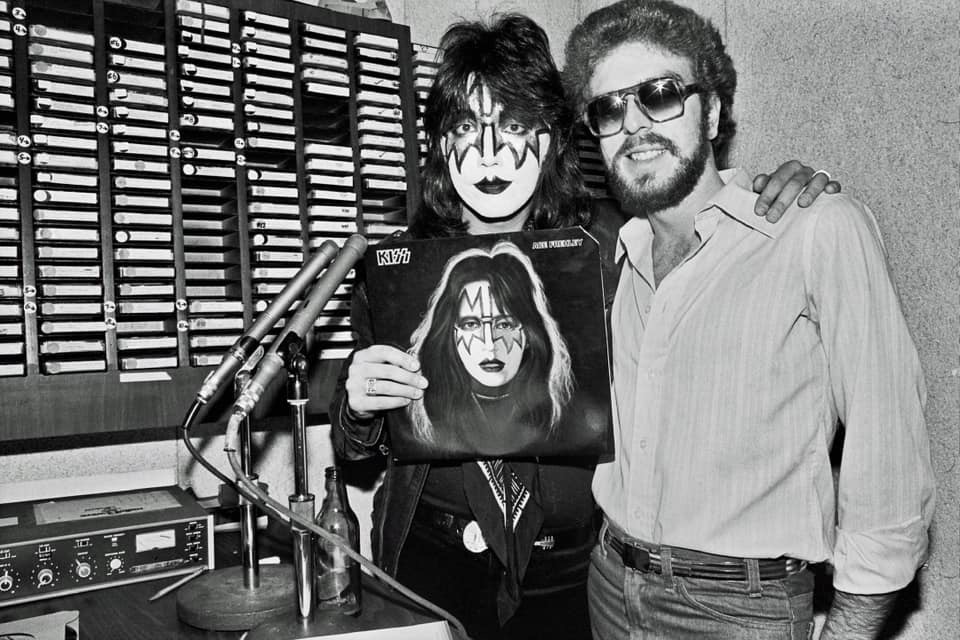
What emerged from that session was easily the best of the four, and one of the great, underrated rock records of the 1970s. Meanwhile, Simmons dabbled in disco and Beatles pop with the celebrities of the era. Stanley, on the other hand, remained true to the KISS sound, while Criss went back to his soul and jazz roots.
Frehley played with power pop on “What’s On Your Mind?” and prog on the instrumental “Fractured Mirror.” Then there’s the smoked-out “Ozone” and the heavy-riffing “Snow Blind.” The album also gave Ace a Top 20 hit with his cover of Hello’s “New York Groove.” It remains a cohesive rock record that’s held in high regard even by those who don’t necessarily like KISS.
When discussing the album he recorded 38 years ago, the details and emotion come spilling out of Ace, who has a notoriously bad memory. The recording concluded at Plaza Sound, above Radio City Music Hall, where jazz greats like Milt Jackson and Pharaoh Sanders cut records in the ’50s and ’60s. Frehley does recall one distraction: the Rockettes, who rehearsed there and frequently, as he puts it “sunned themselves on the roof,” would frequently peek into the studio once they caught wind that a rock star was using Plaza. But he remained focused. It seems there was much more to his mad scientist obsession than simply proving something to his bandmates.
“I wanted to show the world what I could do,” he says. “My abilities had been downplayed for so long; finally I was getting a chance to show everybody what I could do on my own. And I wasn’t going to settle for anything less than the best I could do.”
While the other three original members of KISS are no slouches, Frehley gets the most credit for his musicality. He’s the only one who’s mounted any sort of solo success—and it’s his 1978 record that has no doubt made this possible. Still, Frehley has always been his own worst enemy, and drug use kept him inactive for years at a time. Origins Vol. 1, his third record in seven years, marks a creative burst he hasn’t seen in three decades. Meanwhile, KISS continues on with guitarist Tommy Thayer playing the “Spaceman” every night on stage.
But there is only one Spaceman. And I’m sitting across from him on a sofa in a hotel suite overlooking Manhattan, minutes before he and his publicist invite me to continue the interview in the car on the way to Electric Lady Studios—the house that Hendrix built, and where KISS recorded their five-song demo on March 13, 1973, just six days after I was born. Even though I’m keeping my professional cool, a small part of me is losing my shit.
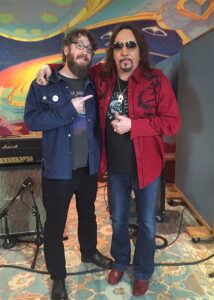
The experience sort of puts things in perspective. The original members are getting older, their legacy cemented, but still marked with skepticism from those who never quite got it. They will be forever connected in ways that no one else can truly understand. It’s strange to think that Ace has been out of KISS longer than he was in the band. It’s even crazier to think that Thayer’s tenure in KISS—now going on 14 years—is closing in on Frehley’s 16 years. His post-KISS life surely isn’t as lucrative as the alternative, but at 65 Ace has a lot to be happy about. And I can vouch for the fact that he still makes a lot of people happy.
“I just keep moving along,” Frehley says, letting out one of his famous cackles. “The last few years have been the most successful in my solo career. And I’m in a good place. Thank God my health is good. I get through it one day at a time. Onward and upward.”
